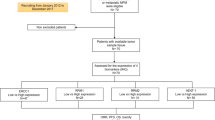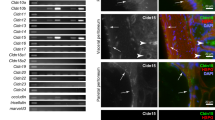Abstract
Introduction
Calretinin and Wilms’ tumor gene (WT1) are mesothelial markers routinely used to confirm the diagnosis of malignant pleural mesothelioma (MPM). We investigated the prognostic value of calretinin and WT1 expression in predicting survival in a series of patients diagnosed with MPM in our institution.
Materials and methods
Fifty-two patients diagnosed of MPM were retrospectively reviewed. Calretinin and WT1 were stained for IHC analysis in formalin-fixed, paraffin-embedded sections and positivity was considered for tumors with >1 % of tumor cells stained. Survival data were calculated by the Kaplan–Meier method and Cox regression was used to evaluate the prognostic value of the variables.
Results
Calretinin IHC expression was positive in 83.7 % of patients and WT1 in 78.1 %. A significant association of calretinin and WT1 expression with epithelial histology was detected (p = 0.030 and p = 0.010). We found a significant increase in OS in patients with epithelial subtype, PS1 and neutrophil–lymphocyte ratio (NLR) ≤5 (p < 0.05). In the IHC markers analysis, we found a significant increase in OS for patients with WT1 positive expression (16.4 vs. 2.3 m, p = 0.013), but not differences for calretinin expression (16.6 vs. 5.0 months, p = 0.37). In the multivariate analysis, epithelial histology and WT1 remained as significant prognostic factors for survival (p = 0.004 and p = 0.010, respectively).
Conclusion
In our series of 52 MPM patients, epithelial histology, PS, NLR and WT1 expression are significant prognostic factors for survival. We concluded that WT1, but not calretinin, is a useful prognostic factor in MPM. The role of WT1 assessment is worth of prospective validation in future studies on MPM.




Similar content being viewed by others
References
Martini N, McCormack PM, Bains MS, Kaser LR, Burt ME, Hilaris BS, et al. Pleural mesothelioma. Ann Thorac Surg. 1987;43:113–20.
Vogelzang NJ, Rusthoven JJ, Symanowski J, Denham C, Kaukel E, Ruffie P, et al. Phase III study of pemetrexed in combination with cisplatin versus cisplatin alone in patients with malignant pleural mesothelioma. J Clin Oncol. 2003;21(14):2636–44.
Van Meerbeeck JP, Gaafar R, Manegold C, VanKlaveren R, VanMarck E. Randomized phase III study of cisplatin with or without raltitrexed in patients with malignant pleural mesothelioma: an intergroup study of the European Organisation for Research and Treatment of Cancer Lung Cancer Group and the National Cancer Institute of Canada. J Clin Oncol. 2005;23:6881–9.
Curran D, Sahmoud T, Therasse P, van Meerbeeck J, Postmus PE, Giaccone G. Prognostic factors in patients with pleural mesothelioma: the European Organization for research and treatment of Cancer experience. J Clin Oncol. 1998;16(1):145.
Edwards JG, Abrams KR, Leverment JN, Spyt TJ, Waller DA, O’Byrne KJ. Prognostic factors for malignant mesothelioma in 142 patients: validation of CALGB and EORTC prognostic scoring systems. Thorax. 2000;55(9):731.
Kao S, Pavlakis N, Harvie R, Vardy J, Boyer M, Zandwijk N, et al. High blood neutropil-to-lymphocyte ratio is an indicator of poor prognosis in malignant mesothelioma patients undergoing systemic therapy. Clin Cancer Res. 2010;16:5805–13.
Marchevsky AM. Application of immunohistochemistry to the diagnosis of malignant mesothelioma. Arch Pathol Lab Med. 2008;232:397–401.
Ordoñez NG. What are the current best immunohistochemical markers for the diagnosis of epithelioid mesothelioma? A review and update. Hum Pathol. 2007;38:1–16.
Kao S, Klebe S, Henderson D, Reid G, Chatfield M, Armstrong NJ, et al. Low calretinin expression and high neutrophil-to-lymphocyte ratio are poor prognostic factors in patients with malignant mesothelioma undergoing extrapleural pneumonectomy. J Thorac Oncol. 2011;6:1923–9.
Pu R, Pang Y, Michael C. Utility of WT-1, p63, MOC31, mesothelin and cytokeratin (K903 and CK5/6) immunostains in differentiating adenocarcinoma, squamous cell carcinoma and malignant mesothelioma in effusions. Diagn Cytopathol. 2008;36:20–5.
Scattone A, Serio G, Marzullo A, Nazzaro P, Corsi F, Cocca M, et al. High Wilm′s tumour gene (WT1) expression and low mitotic count are independent predictors of survival im diffuse peritoneal mesothelioma. Histopathology. 2012;60:472–81.
Kumar-Singh S, Segers K, Rodeck U, Backhovens H, Bogers J, Weyler J, et al. WT1 mutation in malignant mesothelioma and WT1 immunoreactivity in relation to p53 and growth factor receptor expression, cell type transition, and prognosis. J Pathol. 1997;181:67–74.
Kushitani K, Takeshima Y, Amatya V, Furonaka O, Sakatani A, Inai K, et al. Immunohistochemical marker panels for distinguishing between epithelioid mesothelioma and lung adenocarcinoma. Pathol Int. 2007;57:190–9.
O’Reilly KE, Rojo F, She QB, Solit D, Mills GB, Smith D, et al. mTOR inhibition induces upstream receptor tyrosine kinase signaling and activates Akt. Cancer Res. 2006;66:1500–8.
Silberstein GB, Van Horn K, Strickland P, Roberts C, Daniel C. Altered expression of the WT1 Wilms tumor suppressor gene in human breast cancer. Proc Natl Acad Sci USA. 1997;94:8132–7.
Carpentieri DF, Nichols K, Chou PM, Mathews M, Pawel B, Huff D, et al. The expression of WT1 in the differentiation of rhabdomyosarcoma from other pediatric small round blue cell tumors. Mod Pathol. 2002;15:1080–6.
Oji Y, Yamamoto H, Nomura M, Nakano Y, Ikeba A, Nakatsuka S, et al. Overexpression of the Wilms’ tumor gene WT1 in colorectal adenocarcinoma. Cancer Sci. 2003;94:712–7.
Hashiba T, Izumoto S, Kagawa N, Suzuki T, Hashimoto N, Maruno M, et al. Expression of WT1 protein and correlation with cellular proliferation in glial tumors. Neurol Med Chir. 2007;47:165–70.
Ohno S, Dohi S, Ohno Y, Kyo S, Sugiyama H, Suzuki N, et al. Immunohistochemical detection of WT1 protein in endometrial cancer. Anticancer Res. 2009;29:1691–6.
Oates J, Edwards C. HBME-1, MOC-31, WT1 and calretinin: an assessment of recently described markers for mesothelioma and adenocarcinoma. Histopathology. 2000;36:341–7.
Foster MR, Johnson JE, Olson SJ, Allred DC. Immunohistochemical analysis of nuclear versus cytoplasmic staining of WT1 in malignant mesothelioma and primary pulmonary adenocarcinomas. Arch Pathol Lab Med. 2001;125:1316–20.
Ordoñez NG. The immunohistochemical diagnosis of mesothelioma: a comparative study of epithelioid mesothelioma and lung adenocarcinoma. Am J Surg Pathol. 2003;27:1031–51.
Cheever MA, Allison JP, Ferris AS, Finn OJ, Hastings BM, Hecht T. The prioritization of cancer antigens: a national cancer institute project for the acceleration of translational research. Clin Cancer Res. 2009;15:5323–37.
May RJ, Dao T, Pinilla-Ibarz J, Korontsvit T, Zakhaleva V, Zhang R, et al. Peptide epitopes from the Wilms’ tumour 1 oncoprotein stimulate CD4+ and CD8+ T cells that recognize and kill human malignant mesothelioma tumor cells. Clin Cancer Res. 2007;13:4547–55.
Krug LM, Tsao AS, Kass S. Randomized, double-blinded, phase II trial of a WT1 peptide vaccine as adjuvant therapy in patients with malignant pleural mesothelioma (MPM). J Clin Oncol 2011;29(Suppl):abst TPS139.
NCT01265433 randomized study of adjuvant study of adjuvant WT-1 analog peptide vaccine in patients with malignant pleural mesothelioma (MPM) after completion of combined modality therapy.
NCT01890980 phase II study of adjuvant WT-1 analog peptide vaccine in MPM patients after MSK 10-134.
Cristaudo A, Foddis R, Vivaldi A, Guglielmi G, Dipalma N, Filiberti R, et al. Clinical significance of serum mesothelin in patients with mesothelioma and lung cancer. Clin Cancer Res. 2007;13:5076–81.
Lopez-Rios F, Chuai S, Flores R, Shimizu S, Ohno T, Wakahara K, Illei P, et al. Global gene expression profiling of pleural mesotheliomas: overexpression of aurora kinases and P16/CDKN2A deletion as prognostic factors and critical evaluation of microarray-based prognostic prediction. Cancer Res. 2006;66:2970–9.
Singhal S, Wiewrodt R, Malden L, Amin K, Matzie K, Friedberg J, et al. Gene expression profiling of malignant mesothelioma. Clin Cancer Res. 2003;9:3080–97.
Acknowledgments
We would like to thank to José Jimenez for excellent technical assistance with FFPE and immunohistochemistry. We thank Eva López Guerrero for statistical support and Francisco Sánchez Vélez for graphic design.
Conflict of interest
All the authors indicate no financial or other interests that is relevant to the subject matter under consideration in this article.
Author information
Authors and Affiliations
Corresponding author
Rights and permissions
About this article
Cite this article
Cedrés, S., Montero, M.A., Zamora, E. et al. Expression of Wilms’ tumor gene (WT1) is associated with survival in malignant pleural mesothelioma. Clin Transl Oncol 16, 776–782 (2014). https://doi.org/10.1007/s12094-013-1146-6
Received:
Accepted:
Published:
Issue Date:
DOI: https://doi.org/10.1007/s12094-013-1146-6




